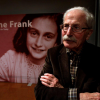
Meet the chairman of Anne Frank New Zealand, Boyd Klap
Q: You grew up in the Netherlands during WW2. Can you tell us what life was like in occupied Holland?
A:The Nazi rule was brutal. Most people did not cooperate with the German occupying force but there were also traitors. That meant that you could not trust people. One of the advantages of our life here in NZ is that our democratic system does not lead to arrest or execution but to freedom of expression.
Then there was always the chance of an air raid so you became experienced. When a bomb came down and it made a whistling sound it was close. My city was bombed 28 times and the flying bombs, the V1 rockets aimed at London, often misfired and came straight down.
During the five years of occupation much of the food produced went to Germany. In 1944/5 there was an enormous food shortage and people were walking long distances to find something to eat. Many died in the streets.
Q: Were you aware during the occupation what was happening to the Jews? How did that make you feel and was there any way you could help?
A: The destruction of Jews in the Netherlands was a gradual process. It started with Jews having to wear the Star of David. Then they were not allowed in parks and in swimming pools. Their food rations were also reduced and children were not allowed to go to school. Jews in Holland had been there for hundreds of years and had integrated in society like in New Zealand. Many were prominent in education, law and business. Again, just like in New Zealand today.
When the German occupiers started to make Jews register and sending them to Germany, Amsterdam went on strike but the leaders of this were arrested and shot. We were under the impression that they were sent to Labour camps,.I had no idea that there were extermination camps. Quite a few Jews were saved; my wife’s mother hid a German Jew till the end of the war.
During those five years I grew up from a first-year college student to an 18 year old young man. During the last year of the war many people in the underground were caught and killed and younger people were recruited. I went into hiding on a farm but then became a courier in the underground.
Q: I'm sure you remember the day of the liberation. What were you doing?
A: Our city was liberated by Canadian troops on the 10th of April 1945. On the day of the liberation tragedy struck. A group of five young members of the underground were discovered and a few hours before the liberation they were executed. The city came under artillery fire and this actually blew the roof off our house.
I was able to cross the lines and assist the Canadians by showing them the way and pinpointing German troop positions.
The liberation was an explosion of joy with street parties, music and dancing in the streets. Collaborators were arrested and in some cases publicly humiliated.
Q: When did you move to NZ and why? Tell us a little about your life here.
A: I graduated with a tertiary diploma (now a degree) in tropical agriculture. It was my aim to work in Indonesia, then the Dutch East Indies, as a tea planter. I did go to Indonesia as a young officer in the Dutch forces fighting the Indonesians who were considered terrorists - history has certainly proved that wrong! After Indonesia became independent I saw no future there. Europe was also in turmoil and a third World War was a real possibility. My commander married a Kiwi and through them my wife and I decided against [other popular destinations] South Africa, the Congo and Australia. We arrived here in 1951.
My career developed in the insurance field and promotions took me to Dunedin, Christchurch, Adelaide and Sydney. My wife decided that New Zealand was home and we returned when I got a CEO job. New Zealand is home to four generations of our family now.
Q: You've been involved with Anne Frank since 2009. What motivates you?
A: Discrimination is at the root of much evil. My parents taught me we are all equal - regardless of colour, gender or religion. I learnt that discrimination is the basis of genocide and indeed the Holocaust. The Anne Frank story is part of my life. As one interviewer put it, it is part of my DNA. I have had a very fortunate life in many ways and this is one way I can contribute to society. It is not always easy but the results are extremely satisfying.
Q: Can you tell us a little about what you hope to achieve over the next three years?
A: I hope that many people will look back and learn from the exhibition that this sort of thing must not happen again. It is a history for today. My main hope is that our education program will reach the majority of high school students. That they will learn about discrimination, the effect of bullying and the Anne Frank story in such a way that it will have a positive impact on the way they live their lives.
